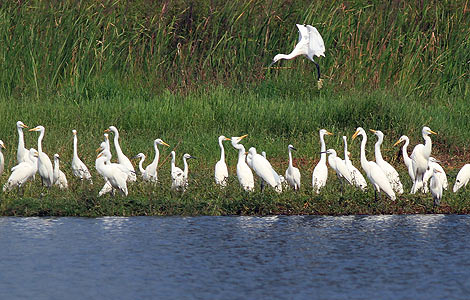
|
 |
|
Egrets are seen at the Poyang Lake in this September 29, 2012 file photo.?[Photo by Zhang Jun/Asianewsphoto]
|
Birds with long necks, such as egrets and herons, sell for between 10 ($1.6) and 70 yuan, while short-necked eagles and owls are priced at hundreds of yuan as the taste of their meat is preferred.
Guidong is at the epicenter of a battle to crack down on the hunting of migratory birds, with Hunan last week forming the nation's first volunteer team on migratory bird protection.
It is badly needed, as ornithologists warn of an additional threat on top of traditional hunting and consumption of wild birds in provincial backwaters. Rising demand in Chinese urban markets, they say, has lured an increasing number of bird purchasers and professional hunters into the area.
"Local residents are unaware of the animals' endangered status, not knowing that many of the cheaply priced bird of prey are actually under state protection," said Li Feng, one of Hunan's volunteers.
Guidong lies along one of eight routes for the world's billions of migratory birds. Every autumn, clouds of birds fly over local mountains as they travel thousands of miles to dock in India and South East Asia.
But unlike the other two routes passing through the western and eastern parts of China, the middle route, forming a narrow channel in the provinces of Hunan and Jiangxi, features a great density of flocks and has been plagued by rampant poaching activities.
In Hunan's counties of Guidong, Xinhua and Xinshao, a village can net more than 150 tons of wild birds a year, with such hunting observed as a tradition by villagers believing in the birds' special health benefits.
"The hunters track and kill birds all the way as they depart from Mongolia and fly south," said Yang Jinhai, who leads the forestry bureau of Xinhua county. "They install high-frequency lights on hilltops and use the light to lure birds into snares at night."
The carcasses are then sold locally or to other Chinese cities, including those in the southern province of Guangdong, where restaurant goers pay generously for meat they see as rare delicacies.
"Eating wild birds is dangerous, as it might bring unknown viruses into human society," said Deng Xuejian, a Hunan-based ornithologist.
Other threats to the flocks include wealthy residents from nearby cities who shoot the birds for fun.
"They come in luxury limousines with beauties and beers, taking it as an aristocratic pastime, which has become a troublesome fashion," Yang said.
Local authorities have stepped up protection efforts, including setting more check points and increasing patrols in the region, though enforcement remains difficult as the poaching usually occurs in remote mountains at night.
Non-governmental groups are also pooling in, with the volunteers set to launch campaigns to lobby urban dwellers to refrain from eating wild birds.
"Only when the trade no longer exists can we truly put an end to the killing," Yang said.







